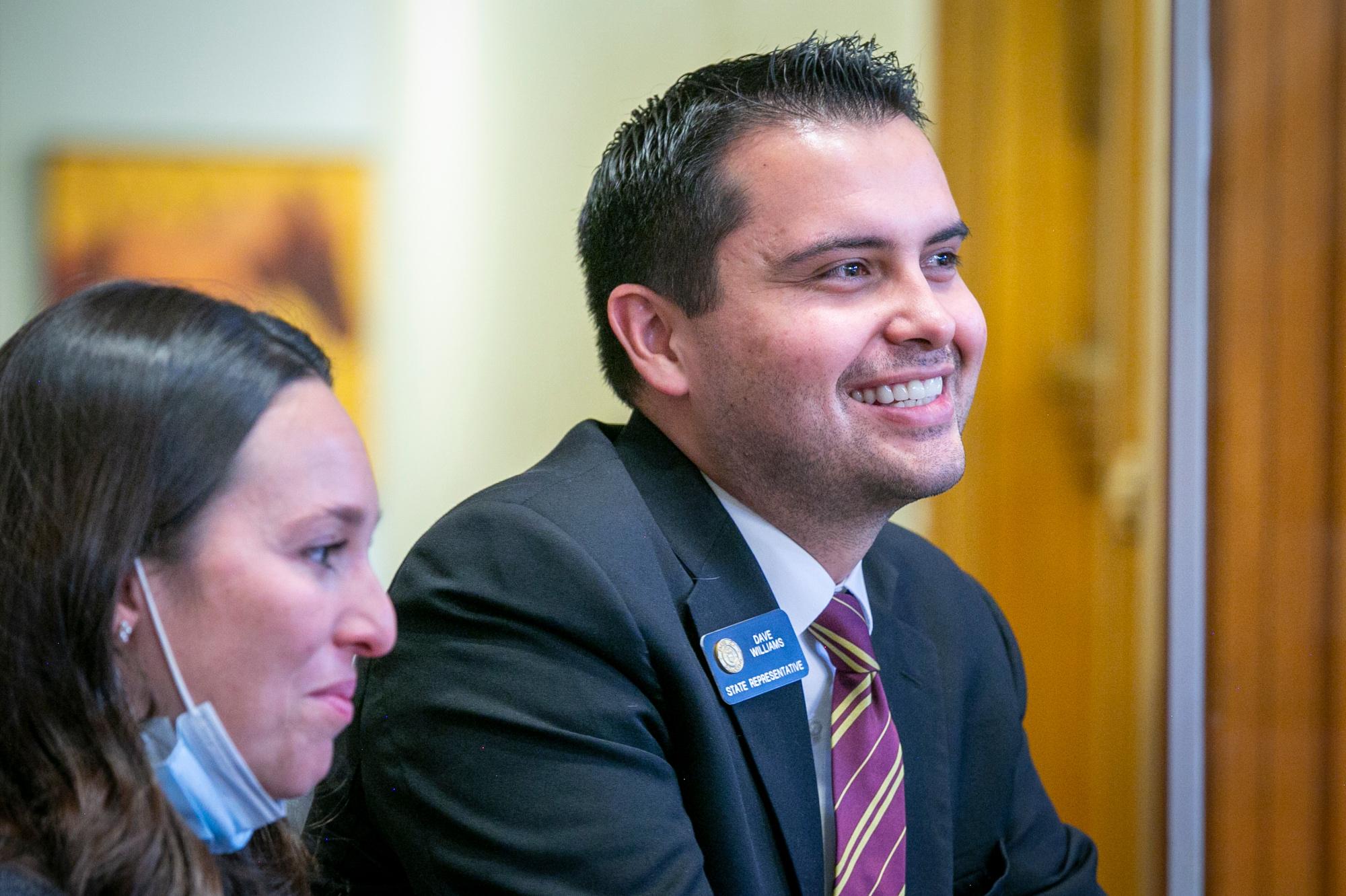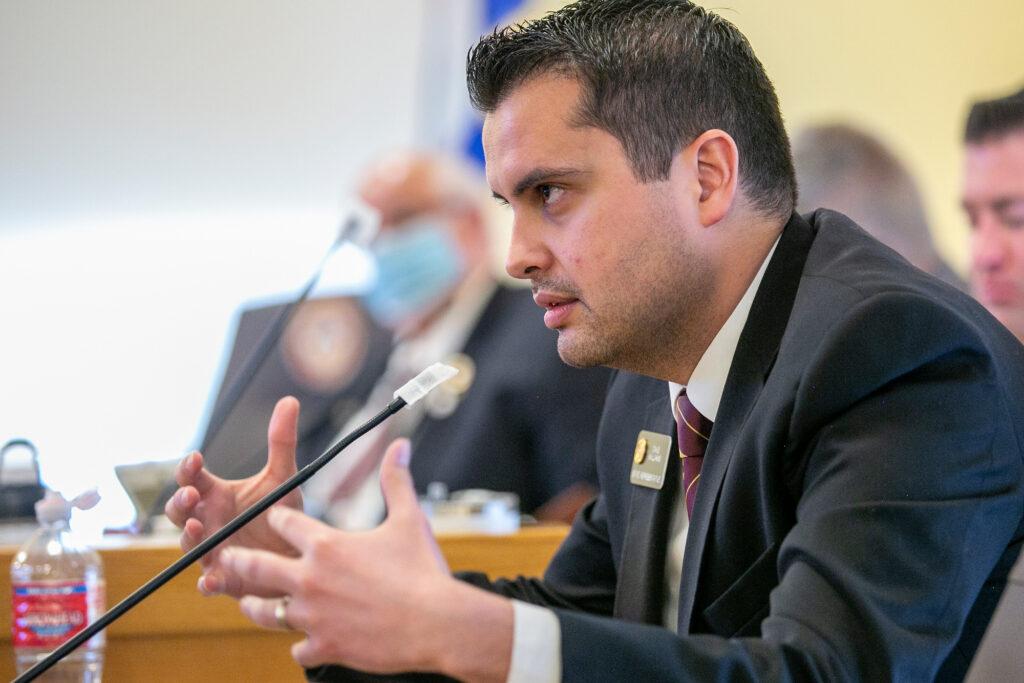
The new head of the Colorado Republican Party is also working full time as a state legislative aide, an unusual arrangement that has some questioning how he can fulfill the responsibilities of both positions without running afoul of legislative rules.
According to legislative records obtained by CPR, GOP chair Dave Williams billed the state 40 hours per week for the pay period following his March 11th election as the Republican chair, and he continues to do so. He did not respond to CPR’s request for an interview for this story.
Williams works remotely for first term Republican state Rep. Brandi Bradley of Douglas County, making the standard aide pay of $20 per hour, plus health benefits and a $10-a-day stipend for telecom expenses. He started in the position in February.
It is not unheard of for a Republican party chair to have a day job — U.S. Rep. Ken Buck held the position for two years while serving in Congress — and historically it was a volunteer role. But Williams’ particular arrangement is raising some eyebrows.
“This is kind of new territory,” said former GOP state party Chair Dick Wadhams who served from 2007 to 2011.
Wadhams said Williams’ job as an aide doesn’t break state party rules, but he wonders how Williams can be a full-time chairman while also working 40 hours a week at a different job.
Republican state Rep. Matt Soper of Delta called the situation problematic, noting that Williams served in the House until just last year.
“I don't think you go from being a legislator to being an aide working remotely. That's not how this system works,” Soper said. “Especially now that he has a full-time job as state party chair, that's where his focus ought to be.”
Soper said he believes Williams has the skill and talent to help the party win back seats, something Republicans desperately need given Democrats’ domination of the congressional delegation and current lock on all the levers within state government. But Soper worries Williams’ job at the state capitol could make it appear that the GOP chair is being subsidized by the taxpayers.
“We don't actually know what he is doing down in Colorado Springs as far as being able to bifurcate what is truly the job of an aide versus being the state party chair, which is all about gaining back power for the Republican party.”
Not in the traditional mold of an aide
The vast majority of aides at the legislature are like Hunter Rivera. The 21-year-old works for Republican state Sen. Barbara Kirkmeyer, who gave him permission to speak to CPR for this story.
Rivera is active in the Republican party and currently serves as the vice-chair of the Weld County GOP. He’s worked on campaigns, but this is his first political job. He said he helps organize emails, answer calls, research bills, sits in on stakeholder meetings, and helps draft policy ideas. He’s worked at the Capitol for three years and really enjoys it.
“It's just a fantastic way of just kind of diving into the political world,” Rivera said.
Aides are allowed to participate in partisan activities such as political campaigns and party work. But they have to be careful to separate their jobs at the capitol from any outside advocacy. Lobbying or partisan activities must be done “on their own time.”
According to a legislative policies and procedures document that aides must adhere to, they should be impartial and free of conflicts of interest while performing their duties, being sure to “maintain objectivity” and not let outside biases impact their work.
In his role as party chair, Williams has regularly sent emails on issues before the legislature, such as encouraging people to come testify for a resolution Bradley is sponsoring on parents rights.
“Radical Democrats are continuing their assault against our children,” Williams wrote in an email on Sunday April 23.
In an email from Monday April 3, he blasted “leftwing nuts” for passing a trio of bills to expand abortion access and urged the public to participate in a petition and rally at the capitol.
Williams is allowed to send these types of emails as long as it’s on his own time, but it makes some lawmakers uncomfortable.
“I really do believe that there needs to be a … wall placed between being the head of a political party and being an aide who's not supposed to engage in partisan politics,” Soper said.
Rep. Bradley, whose office employs Williams at the capitol, said his insight has been invaluable even though he doesn’t take on the duties typical of most aides, such as filing bills or answering constituent emails and phone calls. Instead of seeing him as an employee, Bradley said he’s more of an advisor, helping her establish herself as a legislator.
“What I do love about Dave is he's really good at policy. And as a freshman legislator trying to navigate that and understand what good governance is, he's been an example and a mentor as far as that goes.”
Bradley said Williams knows the law and she believes he is careful to keep his two roles separate. While he’s employed through Bradley’s office, he belongs to a pool of aides for several members and his role is focused on messaging.
“It's more about the policy that we're imposing and how to speak for my constituent base, on the pros and cons of whatever is being presented,” said Bradley.
House Minority Leader Mike Lynch said Williams’ presence hasn't been widely known at the Capitol this year, noting that he hasn’t been referenced or seen inside the building. But Lynch finds it odd that Williams wanted to step into the role of aide.
“It hasn't caused any real problem. It's just kind of weird,” he said, adding that he didn’t expect Williams to continue working as an aide after he was elected chair.
“I hope he's working and giving somebody advice and he's not just milking big government,” Lynch said.
But for Democratic state Rep. David Ortiz of Littleton it makes sense why the head of the state GOP would want to be an aide — it keeps him very connected to the legislature.
“To be able to influence legislators that, in philosophy, are cut from the same cloth he is and be able to use the experience he's gained to try and mentor them and mold them in his image, that's what it comes off as, to me.”
Ortiz said he thinks Williams has a clear conflict of interest as both party chair and legislative aide and hopes legislative leaders are keeping an eye on his activities to make sure he’s not blatantly breaking any rules.
“It's obvious that he is trying to have an influence here in this building and in a way that I don't think has ever been done before. I can't think of a time where a party chair did something like this,” Ortiz said.
Democratic Senate Majority Leader Dominick Moreno, who is himself a former legislative aide, said it’s extremely inappropriate for Williams to have this role. He said aides’ responsibilities should be limited to administrative duties.
“I would say if a legislative aide is engaged in strategy, a caucus legislative strategy, that's not an appropriate role for a legislative aide. It may be an appropriate role for the chair of a major party, but not for a legislative aide.”
He pointed to the example of former state lawmaker Bob Rankin, whose wife Joyce worked as his aide for several years. She left the job when she was elected to the state board of education “because she now held a partisan elected office. I would view the chair of the Colorado Republican Party as a partisan office.”
For his part Williams, who lives in Colorado Springs, told the publication Colorado Politics that he will continue working as an aide for several members for a while.
From challenging a leading party member, to leading the party itself
Williams was a controversial figure during his time at the statehouse and remains so, for his hard charging political style and conservative brand of politics. It’s not uncommon for him to call out other Republicans for being — in his view — too moderate. And he has accused other Republicans of constantly apologizing to the media and Democrats for Republican values.

After six years in the legislature, Williams mounted an unsuccessful primary challenge last year against congressman Doug Lamborn. He tried to have the anti-Biden slogan ‘Let’s go Brandon’ included as his nickname on the ballot, but was denied by a judge. In the end, Williams came in a distant second in the four-way primary, trailing Lamborn by 14 points.
Williams defeated six candidates to win his spot at the helm of the state party. He made the pitch that Colorado is at a historic crossroads and it’s time for the party to chart a new course, unleashing the full potential of the conservative grassroots movement.
The chair’s salary is approved by the party’s executive committee and paid from the Republican state party’s federal account, which currently has a balance of nearly $118,000 cash on hand. The previous chair, Kristi Burton Brown, earned $80,000 her first year and $90,000 her second year.
While Williams has said he intends to collect a salary as chair, the recent campaign finance reports for the party do not show him being paid yet, which would likely happen later when he puts forward a budget for approval.
“It may be his choice that that's how he's paying his bills,” said Senate Minority Leader Paul Lundeen of Williams’ job as an aide. He also noted how abnormal it is.
“I don't know that historically anyone's ever been in that kind of a political role and then that kind of a supporting policy role (at the same time). It might create some wrinkles that are challenging to navigate.”
However, Lundeen said he’s fine with Williams taking on both positions.
“It's up to him to find compliance with the rules and with the laws. I'm confident that he's doing everything he can to comply,” said Lundeen.
But aides can get in trouble if they’re not careful to separate partisan activities from state work.
In January shortly after the legislative session began, Republican state Rep. Stephanie Luck’s aide was asked to resign after she sent an email criticizing those members of the House GOP caucus who voted for Democratic state Rep. Julie McCluskie for Speaker of the House. The email told constituents to “hold them accountable and share with other fellow Grassroot Patriots.”
At issue was the fact that Luck’s aide sent the email during her work day at the Capitol, in violation of the legislative policy document. The punishment was not permanent however; Luck recently rehired her.
Editor's Note: This story has been updated to include comments from Senate Majority Leader Dominick Moreno.








